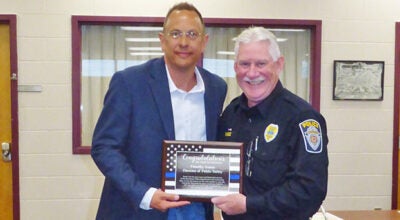‘Gone a Sogerine’
Published 11:16 pm Wednesday, May 4, 2011

Rick Cahaw taught the Civil War with a Climax soldier’s May 27, 1861-Jan. 4, 1864 letters to his brother and parents during his 40-year career with Kalamazoo Public Schools. (The Daily News/John Eby)
The Museum at Southwestern Michigan College concluded its spring lecture series Wednesday evening with “Gone a ‘Sogerine:’ The Civil War Experience of Samuel Chase Hodgman of the 7th Michigan Infantry.”
Guest speaker Rick Cahow, a retired Kalamazoo educator with a master’s degree in history from Western Michigan University, tells Hodgman’s story through 96 letters he wrote describing his experiences during the Civil War.
Hodgman, of Climax, who enlisted at 33, found himself in the wrong place at the wrong time as he witnessed major destruction at every turn.
At Antietam he saw annihilation of his company in the space of 20 minutes.
At Gettysburg, his regiment, 150 strong, met Pickett’s Charge, head-on.
His letters contain first-hand accounts of Antietam, Gettysburg, the New York Draft Riots and the trials and tribulations of soldiering faced by young men who answered President Abraham Lincoln’s call to save the Union.
“In my mind,” he said, “if you’re going to understand the Civil War, you have to understand the generation which fought it.”
Cahow compressed the curriculum crafted for his students (“I didn’t bother with a textbook”) during a 40-year career — 33 at Kalamazoo Central High School and seven years “banished” to a junior high school to boost the number of male instructors.
Former students include the mayor and the young man most influential in President Obama speaking there at graduation last year.
The arc of Hodgman’s life carried him from Michigan to Florida, where he built a church which exists today in Haines City and died April 1, 1900.
Cahaw said Civil War soldiers were motivated by desire to prove themselves and to be part of something larger than themselves so they could look back on their lives as “well-lived” — dutiful commitment hard to instill in students today.
“There is no mention of slavery whatsoever” in Hodgman’s letters to his brother, Charley, a student at what is now Michigan State University, and his parents.
Cahaw has read them so many times the bearded infantry officer who walked all over Virginia, Maryland and Pennsylvania, has come to feel like a well-known friend he refers to as “Sam.”
“My friendship with Sam began as most do — by accident,” Cahaw said. “My college mentor, a professor emeritus (at WMU) was cleaning out file cabinets.”
Their relative from Iowa didn’t leave them any letters, but they directed him to an archivist with a three-folder “mother lode.”
He started reading in the middle at random.
It took him three years to transcribe the letters from the flowing penmanship since he never had a typing class.
“I can find no evidence that Sam ever told his own story” outside his immediate family.
“It confused the heck out of my students,” Cahaw said, “but I told them I wanted them to understand the war was not about slavery until 1863. It was about two words — is and are,” as in the United States are…, which a Confederate would say to indicate state sovereignty, as opposed to the preferred Union verb choice, the United States is…
“If you’re Abraham Lincoln or Sam Hodgman,” he added, “you believe the proper way is United States is. Lincoln brings in the slavery issue in 1863 as a strategic decision to keep the British out. You also tap into manpower that has not been willing to come forward yet by making it a moral crusade to abolish slavery. You tap into the abolitionists.”
“Absolutely” one reason for the riots in New York was the feeling that the rich were able to buy their way out of combat, Cahaw agreed, adding that it’s not surprising that Hodgman’s leg injuries at Antietam didn’t prevent him from returning to battle because of the strong “human bond” veterans feel for comrades.
“That drove him. A lot of people look at leadership and automatically think of power … when it’s about responsibility. That’s what you’re proving to yourself. If you are responsible, the leadership comes naturally and a group of soldiers will follow.”
Hodgman laments the heartless outlooks war brought about in the troops.
“They behaved in a way totally foreign to them,” Cahaw said.
“He remarks in a number of letters that the men have been without civilizing female influence for too long. You have young men living among themselves, then you give them guns and tell them to ignore all the religious teachings with which they’ve been raised … A soldier’s life is 99 percent boredom and 1 percent terror.
“I was shocked to hear from a National Guard person who came and talked to my class that they had guys in their unit when they were deployed to Iraq saying, ‘I didn’t sign up for this.’
“I’ve got a good friend who’s a company sergeant deploying to Afghanistan in July. He’s getting calls from guys in his unit saying they don’t want to go, and he has to remind them, ‘Dude, you took the bonus. You’re going.’ ”






